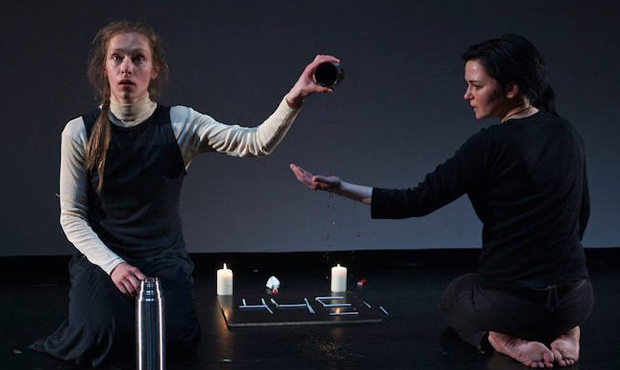Michael Coveney: Underground with Belarus Free Theatre

They say the tunnel-shaped brick vaults, all that remains of the old 17th century Clerkenwell prison, are haunted. On Monday, with the opening production of the Belarus Free Theatre's tenth anniversary celebrations, the ghost of Sarah Kane certainly moved among an audience of eighty people, and a small BBC film unit, as two actresses knocked the living daylights out of her final play, the stunning suicide note that is 4:48 Psychosis.
The performance – in Russian, with surtitles – was simultaneously live-streamed to Belarus, where a small audience in Minsk waved and exchanged greeting with us via Skype on co-founder Natalia Kaliada's laptop. I hadn't seen the play since the first performance in the Royal Court's Theatre Upstairs in 2000, one year after Kane died. It seemed then a self-analytical theatrical poem – Daniel Evans was in a cast of three – with a good dollop of gallows humour.
Now, in a banned theatre company, in a country where, in 2005, the BFT's opening production of it was condemned by the political regime, denying that suicide and mental disorders even existed in Belarus, its metaphor of anguish and despair is stirred into a powerful cry and demand for freedom and escape. The quality of the writing, and the sensational authenticity of the performances by Maryia Sazonava and Yana Rusakevich, brings this about.
The very much "live" performance was at first superimposed on a film of the original Belarus premiere, complete with that audience, the lit candles from the video and "right now" intermingling before the actors in front of us took over: spooky, or what?
To reinforce the sense of samizdat and secrecy under which the company has to operate at home, the audience had been directed to the vaults – Monday's "undisclosed location," as are all the locations before the celebrations move into the Young Vic next week – after assembling on Clerkenwell Green, outside, as it happens, the Marx memorial museum.
We had brought along, as directed, ID, cash and warm clothing. Dominic Cavendish of the Daily Telegraph had grown a beard. We were name-checked on the door. Will Gompertz, the BBC's arts correspondent, was interviewing the censored Malaysian cartoonist Zunar, BFT's special guest, who regularly lampoons the tyranny and corruption of the Malaysian government, and who returns home on Friday to stand trial and face a jail sentence of 43 years. He was being shepherded by editors from Index on Censorship.
All this cloak and dagger stuff, the pretence of being part of something illegal and genuinely subversive, took me personally back to Prague and Brno in 1989, when I visited the underground, banished Czech theatre, dismantled in the Prague Spring of 1968 – its glories had been displayed at several World Theatre Seasons at the Aldwych in the early 1960s – but soon reconstituted with the release from prison (having served six years in all) of playwright Vaclav Havel and the Velvet Revolution of November later that year.
Cheek by Jowl were also in Prague in March 1989. Their production of The Tempest, with its whimsical dispensations of civil liberty and sarcastic songs of free thought by the wrecked sailors, struck a huge gong in this super-charged context. Similarly, I was shattered to come across a leading (banned, more or less ruined) actor offering a lecture on Hamlet – he couldn't advertise "a play" – in a damp cellar sponsored by the metalworkers' trades union, as if in a kitchen where the play itself was a pot of stew and the characters, kitchen utensils, Laertes a chopper, Polonius a colander, and so on. Poor non-theatre, but no affectation.
This idea of non-theatre had been enforced by the authorities and was a far cry indeed from un-Forced Entertainment's current jape of performing the Bard with vegetables on a table, like finger puppets. How radical is that? You're right: not at all. Similarly, although I quite liked one or two efforts in Sean Holmes's "Secret Theatre" season at the Lyric, Hammersmith, the idea of this being a version of samizdat artistic activity in a country where no artist's life is under any sort of political or authoritarian threat borders on the ludicrous.
Belarus Free Theatre has some notable friends and champions in this country – Tom Stoppard, David Lan of the Young Vic, fashion designer Vivienne Westwood and Shakespeare's Globe director Dominic Dromgoole – and they've all contributed essays to a neat little book of polemics, On Freedom. After the performance, we flicked through its pages while chatting amongst ourselves, feeding on beetroot soup and chunks of bread, sipping wine or beer.
Then a discussion, seated once more on the hard benches, knees covered in blankets against the freezing cold of the prison vaults, and dispersal onto the Farringdon Road. There may have been the odd surveillance camera on street corners, but no-one jumped out from behind a hedge to drag us away to prison, or prevent us from saying exactly what we thought about the play, or anything else. We're lucky.










